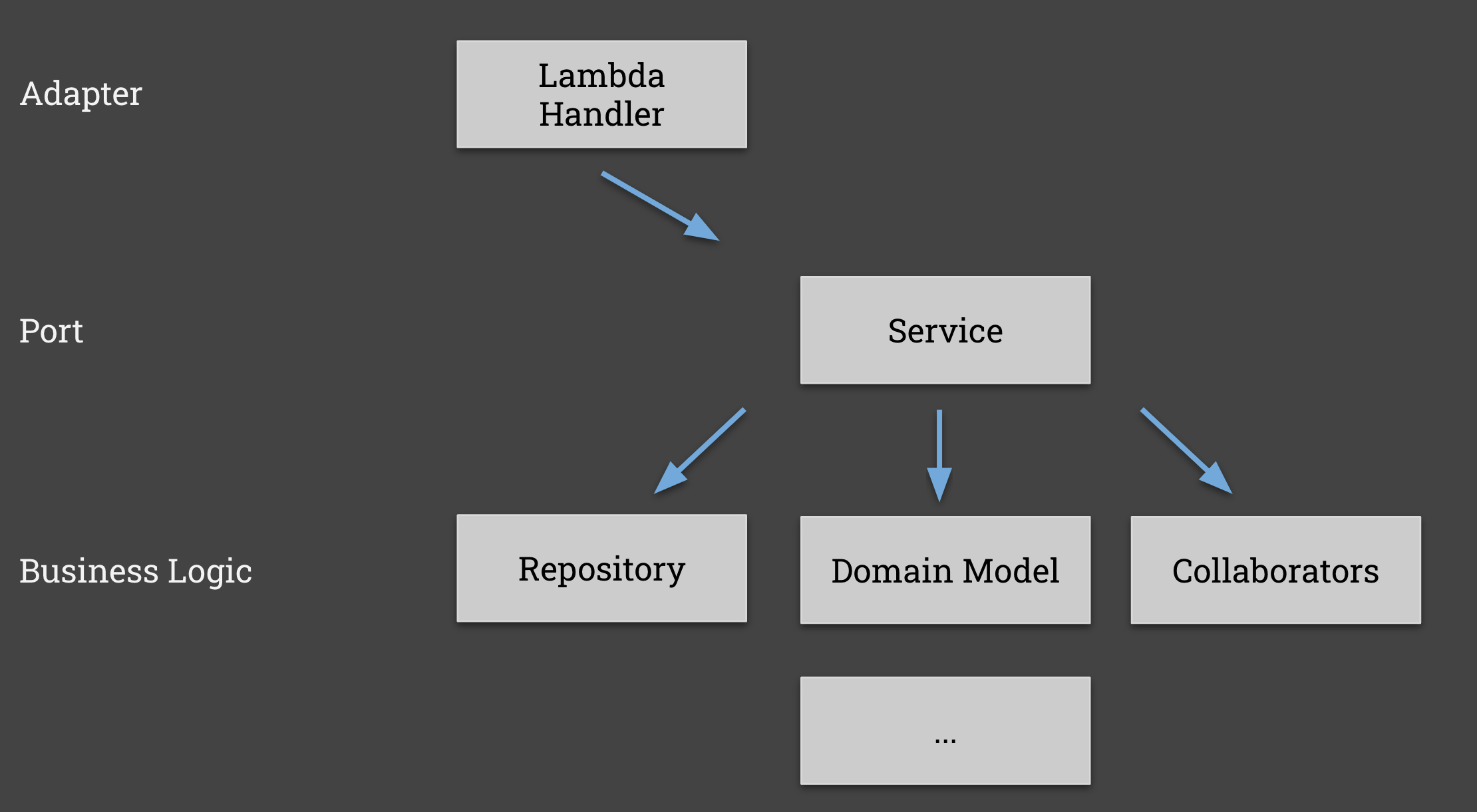Step 1 - Create Consumer (Subscriber)
Learning Objectives
| Step | Title | Concept Covered | Learning objectives | Further Reading |
|---|---|---|---|---|
| step 1 | Create our consumer before the Provider API even exists | Consumer-driven design with Hexagonal Architecture |
|
Hexagonal Architecture
We recommend that you split the code that is responsible for handling the protocol specific things - for example an AWS lambda handler and the AWS SNS input body - and the piece of code that actually handles the payload.
You're may be familiar with layered architectures such as Ports and Adapters (also referred to as a Hexagonal architecture) - If not, we recommend reading Alistair Cockburn's guide.
Following a modular architecture will allow you to do this much more easily:

Our Scenario
Let's walk through an example using a product event published through a message broker, in our instance Kafka as an example.
The consumer expects to receive a message of the following shape:
{
"id": "some-uuid-1234-5678",
"type": "spare",
"name": "3mm hex bolt",
"version": "v1",
"event": "UPDATED"
}
Adapter
With this view, the "Adapter" will be the code that deals with the specific queue implementation. For example, it might be the lambda handler that receives the SNS message that wraps this payload, or the function that can read the message from a Kafka queue (wrapped in a Kafka specific container). Here is the kafka version:
- Javascript
- Java
- Python
- C#
- Golang
- Rust
in consumer-js-kafka/src/service/kafka.js:
const consumeProductStream = async (handler) => {
await consumer.connect();
await consumer.subscribe({ topic: "products", fromBeginning: false });
await consumer.run({
eachMessage: async ({ topic, partition, message }) => {
console.log("received message");
try {
await handler(JSON.parse(message.value.toString()));
} catch (e) {
console.error("unable to handle incoming message", e);
}
},
});
};
in consumer-java-kafka/src/main/java/io/pactflow/example/kafka/KafkaConfiguration.java:
@EnableKafka
@Configuration
public class KafkaConfiguration {
@Bean
public ConsumerFactory<String, Product> productConsumerFactory() {
Map<String, Object> props = new HashMap<>();
props.put(ConsumerConfig.BOOTSTRAP_SERVERS_CONFIG, "localhost:9092");
props.put(ConsumerConfig.GROUP_ID_CONFIG, "products_group");
props.put(ConsumerConfig.KEY_DESERIALIZER_CLASS_CONFIG, StringDeserializer.class);
props.put(ConsumerConfig.VALUE_DESERIALIZER_CLASS_CONFIG, JsonSerializer.class);
return new DefaultKafkaConsumerFactory<>(props, new StringDeserializer(), new JsonDeserializer<>(Product.class));
}
@Bean
public ConcurrentKafkaListenerContainerFactory<String, Product> kafkaListenerContainerFactory() {
ConcurrentKafkaListenerContainerFactory<String, Product> factory = new ConcurrentKafkaListenerContainerFactory<>();
factory.setConsumerFactory(productConsumerFactory());
return factory;
}
}
in consumer-dotnet-kafka/src/KafkaConsumer.cs:
consumer.Subscribe(_topic);
var processor = new ProductEventProcessor();
try
{
while (true)
{
var cr = consumer.Consume(cts.Token);
Console.WriteLine($"Consumed event from topic {_topic}: key = {cr.Message.Key,-10} value = {cr.Message.Value}");
var productEvent = System.Text.Json.JsonSerializer.Deserialize<ProductEvent>(cr.Message.Value);
processor.ProductEventHandler(productEvent);
}
}
in consumer-python-kafka/src/_kafka/product.py:
def consume_messages():
...
# Subscribe to topic
topic = "products"
consumer.subscribe([topic])
try:
while True:
msg = consumer.poll(1.0)
if msg is None:
print("Waiting...")
elif msg.error():
print("ERROR: %s".format(msg.error()))
else:
print("Consumed event from topic {topic}: value = {value:12}".format(
topic=msg.topic(), value=msg.value().decode('utf-8')))
message_handler(msg)
...
in consumer-go-kafka/kafka_consumer.go:
func KafkaConsumer() {
...
topic := "products"
err = c.SubscribeTopics([]string{topic}, nil)
...
fmt.Printf("Consumed event from topic %s: key = %-10s value = %s\n",
*ev.TopicPartition.Topic, string(ev.Key), string(ev.Value))
var productEvent ProductEvent
err = json.Unmarshal(ev.Value, &productEvent)
if err != nil {
fmt.Printf("Failed to unmarshal event value: %s", err)
continue
}
handler(productEvent.Product, productEvent.Event)
...
}
in consumer-rust-kafka/src/main.rs:
async fn kafka_consumer(data: web::Data<AppState>) {
let consumer: StreamConsumer = ClientConfig::new()
.set("group.id", "products-group")
.set("bootstrap.servers", "localhost:9092")
.create()
.expect("Consumer creation failed");
consumer
.subscribe(&["products"])
.expect("Can't subscribe to topic");
let mut message_stream = consumer.stream();
while let Some(message) = message_stream.next().await {
match message {
Ok(m) => {
if let Some(payload) = m.payload() {
product_event_processor(&data, payload);
}
}
Err(e) => eprintln!("Kafka error: {}", e),
}
}
}
Port
The "Port" is the code that is unaware of the fact it's talking to SNS or Kafka, and only deals in the domain itself - in this case the product event.
This will be the target of our test
- Javascript
- Java
- Python
- C#
- Golang
- Rust
in consumer-js-kafka/src/product/product.handler.js:
const handler = (product) => {
console.log("received product:", product);
console.log("received product event:", product.event);
if (product.event == "CREATED" || product.event == "UPDATED") {
return Promise.resolve(
repository.insert(
new Product(product.id, product.type, product.name, product.version)
)
);
} else if (product.event == "DELETED") {
return Promise.resolve(
repository.delete(
new Product(product.id, product.type, product.name, product.version)
)
);
}
throw new Error("Unable to process event");
};
in consumer-java-kafka/src/main/java/io/pactflow/example/kafka/ProductEventListener.java:
@Service
public class ProductEventListener {
public static Logger logger = LoggerFactory.getLogger(Application.class);
@Autowired
private ProductRepository repository;
@KafkaListener(topics = "products")
public void listen(Product product) throws Exception {
logger.info("received product event: {}", product);
repository.save(product);
}
}
in consumer-dotnet-kafka/src/ProductEventProcessor.cs:
using System;
using System.Text.Json.Serialization;
using System.Threading.Tasks;
namespace Products
{
public class ProductEventProcessor
{
private readonly ProductRepository _repository;
public ProductEventProcessor()
{
_repository = ProductRepository.GetInstance();
}
public class ProductEvent(string id, string type, string name, string version, string @event) : Product(id, type, name, version)
{
[JsonPropertyName("event")]
public string Event { get; set; } = @event;
}
public Task ProductEventHandler(ProductEvent productEvent)
{
Console.WriteLine($"Received product: {productEvent}");
Console.WriteLine($"Received product event: {productEvent.Event}");
Console.WriteLine($"Received product id: {productEvent.id}");
if (productEvent.Event == "CREATED" || productEvent.Event == "UPDATED")
{
_repository.AddProduct(new Product(productEvent.id,productEvent.type,productEvent.name,productEvent.version));
}
else if (productEvent.Event == "DELETED")
{
_repository.RemoveProduct(productEvent.id);
}
else
{
throw new InvalidOperationException("Unable to process event");
}
return Task.CompletedTask;
}
}
}
in consumer-python-kafka/src/product/product_service.py:
async def receive_product_update(product: Dict) -> Products:
return await repository.insert(Product(product['id'], product['type'], product['name']))
in consumer-go-kafka/handler.go:
func handler(product Product, event string) error {
fmt.Println("received product:", product)
fmt.Println("received product event:", event)
switch event {
case "CREATED", "UPDATED":
return productRepository.Insert(&product)
case "DELETED":
return productRepository.Delete(product.ID)
default:
return errors.New("unable to process event")
}
}
in consumer-rust-kafka-async/src/main.rs:
pub fn product_event_processor(data: &web::Data<AppState>, payload: &[u8]) {
let product_event: ProductEvent =
serde_json::from_slice(payload).expect("Error deserializing product");
let product = Product {
id: product_event.id.clone(),
r#type: product_event.r#type.clone(),
name: product_event.name.clone(),
version: product_event.version.clone(),
};
let mut products = data.products.lock().unwrap();
match product_event.event.as_str() {
"CREATED" | "UPDATED" => {
products.insert(product_event.id.clone(), product);
}
"DELETED" => {
products.remove(&product.id);
}
_ => {
eprintln!("Unknown event type");
}
}
}
Step 2
We can now move onto step 2, where we will write a test for our event processor.
Move on to step 2